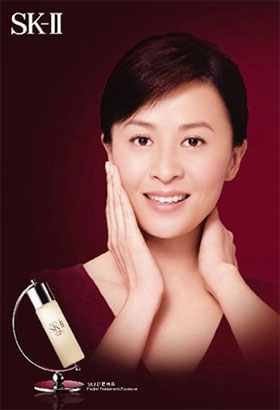While many Chinese catch up on their favorite movies during the weeklong
National Day vacation, a woman in south China's Jiangxi Province is waiting for
a local court to respond to her request to sue a movie star.

Carina Lau, a well-known Hong Kong star,
appeared in advertising for Japanese cosmetics brand SK-II owned by
Procter & Gamble. [163.net] |
"She should pay for cheating customers with false advertising," said furious
43-year-old Lu Ping. She filed a lawsuit against Carina Lau, a Hong Kong star,
who appeared in advertising for Japanese cosmetics brand SK-II owned by Procter
& Gamble.
Lu saw the advertisement in a fashion magazine in January last year, in which
Carina claimed that using the product for four weeks could help "reduce wrinkles
by 47 percent and make you appear 12 years younger". Because she is about the
same age as the actress, Lu decided to try out the product.
She bought a bottle of skin-tightening, anti-wrinkle facial milk. But 28 days
later, her skin had not become silky. Instead, her face became itchy and she
felt a burning sensation.
Last month, China's General Administration of Quality Supervision, Inspection
and Quarantine found chromium and neodymium in nine SK-II products, including
the one Lu used. The toxic heavy metals can cause dermatitis and skin rashes.
Neodymium also causes harm to eyes, lungs and liver. They are banned for use in
cosmetics in China.
SK-II products were taken off the shelves in China last September and the
company was fined 200,000 yuan (25,000 U.S. dollars) for false advertising. But
Lu believes that Carina Lau is also culpable. "I wouldn't have bought it (the
product) if she hadn't advertised it," she said.
To fuel Lu's anger, Carina told the public after "SK-II Gate" that "there is
nothing wrong with the brand" and she would "support SK-II as always."
"Celebrities influence consumers, especially when they are idolized and
trusted," said Qiu Baochang, director of the committee for protecting consumers'
rights under the Beijing Bar Association. Misleading consumers with false
advertisements, Qiu said, is potentially very harmful.
Carina Lau is not the only celebrity to be involved in questionable
advertising. An actor who had appeared on screen as Chairman Mao promoted a
hospital to cure sterility, and an actress vaunted the merits of a medicine with
her son. The advertisements were cancelled, but neither actor was punished.
Regulations and laws do not specify the responsibility of celebrities in
cases of false advertising.
Lu Ping's attorney Tang Wei believes that if a movie star promotes a product
without paying attention to product quality, the advertisements will - at the
very least - damage his or her reputation. "Besides," Tang said, "false
advertisements are equivalent to fraud, and those who profit from fraud are
guilty." He is confident about the lawsuit.
In an online survey conducted by the China Consumers' Association, over 78
percent of netizens said that celebrities should share legal responsibility if
product advertisements turn out to be false or misleading.
Medical and food advertisements with celebrities acting as patients,
consumers and experts were banned this August by the State Administration of
Industry and Commerce, while Qiu called on lawmakers to specify celebrities'
legal duties in advertising.
He proposed that celebrities sign a contract with advertising agencies to
ensure product quality. By doing so, they could not only protect their own
reputation, but force producers to be more careful.
Qiu urged consumers to be sensible and cautious and not to follow
advertisements blindly.
Lu Ping, anxious that her case will be dealt with soon, said that celebrities
should know something about the products they promote. "I guess actresses can't
pay for labs to check the safety of cosmetics, but at least they can stop
promoting them when the products are shown to have quality
problems."